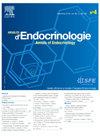Mental health, anxiety, depression and risk of dysthyroidism
IF 2.9
3区 医学
Q3 ENDOCRINOLOGY & METABOLISM
引用次数: 0
Abstract
Background
Psychological stress has been implicated in several autoimmune pathologies, but the relationship between mental health and dysthyroidism has not been clearly elucidated. The aim of the present study was to prospectively assess the relationship between mental health and incident risk of dysthyroidism.
Population
In all, 418,622 UK Biobank participants, without dysthyroidism at baseline, were included. Mental health was assessed at inclusion on the Patient Health Questionnaire-4 (PHQ-4). Subsequent diagnoses of hyper- or hypo-thyroidism were extracted from medical files. Survival curves were used to compare incidence of dysthyroidism according to PHQ-4 score on a multivariate Cox model.
Results
Over a median 12.3 years’ follow-up, there were 2242 and 9419 new cases of hyper- and hypo-thyroidism, respectively. There was a gradual association between baseline mental health score and incident risk of dysthyroidism: HR for 1 standard deviation: 1.13 (95% CI: 1.08–1.18); P <0.001 for hyperthyroidism, and 1.11 (95% CI: 1.09–1.13); P <0.001 for hypothyroidism. Subjects with poorer mental health on the PHQ-4 had greater risk of developing hyperthyroidism (adjusted HR: 1.70; 95% CI: 1.09–2.65) or hypothyroidism (adjusted HR: 1.70; 95% CI: 1.36–2.12) than those with better mental health. Anxiety and depression, considered separately, were both significantly associated with risk of dysthyroidism. The results were the same using clinical diagnoses instead of PHQ-4 scores.
Conclusion
Mental health, anxiety and depression were significantly associated with onset of hyper- or hypo-thyroidism in the general population. These findings support monitoring thyroid function in subjects experiencing psychological suffering.
心理健康,焦虑,抑郁和甲状腺功能障碍的风险
心理应激与多种自身免疫性疾病有关,但心理健康与甲状腺功能障碍之间的关系尚未清楚阐明。本研究的目的是前瞻性评估心理健康与甲状腺功能障碍事件风险之间的关系。总共纳入了418622名基线时无甲状腺功能障碍的英国生物银行参与者。在患者健康问卷-4 (PHQ-4)中进行心理健康评估。从医疗档案中提取甲状腺功能亢进或低下的后续诊断。生存曲线根据PHQ-4评分在多变量Cox模型上比较甲状腺功能障碍的发生率。结果在中位12.3年的随访中,分别有2242例和9419例甲状腺功能亢进症和甲状腺功能减退症新发病例。基线心理健康评分与甲状腺功能障碍事件风险之间存在逐渐关联:1个标准差的HR: 1.13 (95% CI: 1.08-1.18);甲亢的P <;0.001, 1.11 (95% CI: 1.09-1.13);甲状腺功能减退的P <;0.001。心理健康状况较差的PHQ-4受试者发生甲亢的风险较高(调整后风险比:1.70;95% CI: 1.09-2.65)或甲状腺功能减退(校正HR: 1.70;95% CI: 1.36-2.12)。单独考虑,焦虑和抑郁都与甲状腺功能障碍的风险显著相关。使用临床诊断代替PHQ-4评分的结果是相同的。结论心理健康、焦虑和抑郁与普通人群甲状腺功能亢进或低下的发病有显著相关性。这些发现支持在经历心理痛苦的受试者中监测甲状腺功能。
本文章由计算机程序翻译,如有差异,请以英文原文为准。
求助全文
约1分钟内获得全文
求助全文
来源期刊

Annales d'endocrinologie
医学-内分泌学与代谢
CiteScore
4.40
自引率
6.50%
发文量
311
审稿时长
50 days
期刊介绍:
The Annales d''Endocrinologie, mouthpiece of the French Society of Endocrinology (SFE), publishes reviews, articles and case reports coming from clinical, therapeutic and fundamental research in endocrinology and metabolic diseases. Every year, it carries a position paper by a work-group of French-language endocrinologists, on an endocrine pathology chosen by the Society''s Scientific Committee. The journal is also the organ of the Society''s annual Congress, publishing a summary of the symposia, presentations and posters. "Les Must de l''Endocrinologie" is a special booklet brought out for the Congress, with summary articles that are always very well received. And finally, we publish the high-level instructional courses delivered during the Henri-Pierre Klotz International Endocrinology Days. The Annales is a window on the world, keeping alert clinicians up to date on what is going on in diagnosis and treatment in all the areas of our specialty.
 求助内容:
求助内容: 应助结果提醒方式:
应助结果提醒方式:


